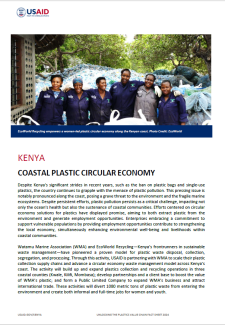Despite Kenya's significant strides in recent years, such as the ban on plastic bags and single-use plastics, the country continues to grapple with the menace of plastic pollution. This pressing issue is notably pronounced along the coast, posing a grave threat to the environment and the fragile marine ecosystems. Despite persistent efforts, plastic pollution persists as a critical challenge, impacting not only the ocean's health but also the sustenance of coastal communities. Efforts centered on circular economy solutions for plastics have displayed promise, aiming to both extract plastic from the environment and generate employment opportunities. Enterprises embracing a commitment to support vulnerable populations by providing employment opportunities contribute to strengthening the local economy, simultaneously enhancing environmental well-being and livelihoods within coastal communities.
Watamu Marine Association (WMA) and EcoWorld Recycling—Kenya’s frontrunners in sustainable waste management—have pioneered a proven model for plastic waste disposal, collection, segregation, and processing. Through this activity, USAID is partnering with WMA to scale their plastic collection supply chains and advance a circular economy waste management model across Kenya’s coast. The activity will build up and expand plastics collection and recycling operations in three coastal counties (Kwale, Kilifi, Mombasa); develop partnerships and a client base to boost the value of WMA’s plastic; and form a Public Limited Company to expand WMA’s business and attract international trade. These activities will divert 1080 metric tons of plastic waste from entering the environment and create both informal and full-time jobs for women and youth.

